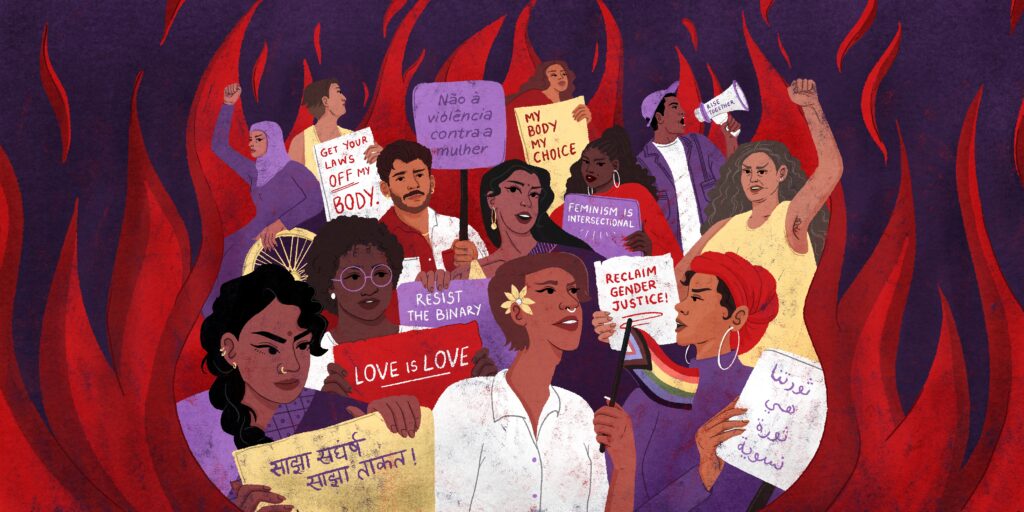Countering Backlash partner, Women of Uganda Network (WOUGNET), recently participated in the Digital Rights and Inclusion Forum (DRIF) in Nairobi, Kenya and RightsCon in Costa Rica. During the two events, WOUGNET led discussions on the challenges faced by women’s rights advocates and the broader gender justice movement in the face of increasing online gender-based violence and shrinking civic space.
Joined by Countering Backlash partners BRAC Institute of Governance and Development (BIGD – Bangladesh) and NEIM (Brazil), along with a representative from the Ugandan police force, sessions highlighted the emergence of new forces and alliances that are actively pushing back against the progress made in achieving gender equality and justice, both globally and in Africa.
Participants discussed the various manifestations of gender backlash, such as the formulation of restrictive laws and legal frameworks, attacks on human rights and defenders, and the use of digital technology to propagate misogynist narratives.
WOUGNET spoke about the continuous attacks on gender activists and human rights defenders in Uganda, where laws and policies are enacted that restrict their activities, such as the recent Anti-homosexuality Act 2023 and amended Computer Misuse Act 2022. The blocking of online platforms also further erodes gender justice, minimising the potential for collective action and the amplification of marginalised voices.
Countering Backlash partner BIGD reported on their recently published research on online gender-based violence and backlash against women gender justice actors in Bangladesh. Currently, the south-Asian country is seeing a rapid increase in internet usage, particularly on Facebook, though evidence shows that almost 68% of Facebook users are men. According to Iffat Antara (Senior Researcher at BIGD), digital space has become an essential medium for activists and individuals to reach global audiences with messages on human rights, gender justice, and other critical social issues. They also addressed opposition from religious leaders towards comprehensive sexuality education policies and the push for discriminatory legislation such as the Anti-homosexuality Act 2023 of Uganda which argues that children’s understanding of their sexual rights makes them ‘pro-sexual’.
WOUGNET’S role in Countering Backlash
Sandra Aceng, Executive Director of WOUGNET, introduced the organisation’s work. WOUGNET has focused much of its research on online gender-based violence, and is currently implementing a project supported by the Association for Progressive Communications (APC) called Our Voices, Our Futures, which aims to improve civic space online in Uganda for the women human rights defenders and feminists. WOUGNET’s goal through this project is to enhance its research on online gender-based violence and empower women actively to actively participate in shaping inclusive policies.
Efforts by the Ugandan Police Force
Francis Ogweng, Assistant Superintendent of Police in Uganda, shared the initiatives undertaken by the Uganda Police Force to promote gender justice. He said that the police are making progress towards promoting gender equality, thanks to the establishment of several directorates and departments that have an objective of reporting, analysing and tackling online gender-based violence, including the Gender Policy 2018. Besides these, there has been increased engagement with men on gender equality work as a strategy to reduce gender backlash in policing. Ogweng reported that senior officers have been promoted to higher ranks as a strategy to promote gender equality.
Ogweng is a He-For-She champion of UN Women and Uganda Police where he has promoted positive masculinity within the police. His role as champion resulted from the Uganda Police’s negative image when it comes to working with women and girls.
Despite the recent Anti-Homosexuality Act, Ogweng noted that there are a number of male-led organisations and Government initiatives promoting gender equality and ministries and other non-governmental organisations have programmes targeting male involvement in gender equality work.
Professor Maira Kubik, a Countering Backlash research partner NEIM in Brazil, defined gender backlash as a setback on rights that have not yet been achieved.
What are the trends in online gender backlash?
Antara’s research in Bangladesh explored online hate and threats of violence towards advocates for gender justice, and women in general, causing them to lose confidence and an interest in speaking out. The findings indicate that the violence women experience online has some common forms. These mainly focus on sexually explicit hate comments labelling women as sex workers, and particularly targeting women feminist activists, lawyers, and journalists. She then suggested the need to identify the severity of online gender-based violence against women on gender backlash and to improve the legal frameworks.
What are some of the achievements in gender justice?
Some of WOUGNET’s work on gender backlash is conducting research to understand the challenges that the communities we work with face. This research has shaped the capacity building work done over the years for women, and our community of practice around laws such as Uganda’s Computer Misuse Act 2011 as amended 2022, Data Protection and Privacy Act 2019, and the Anti-Pornography Act 2014 – three policies that significantly affect the meaningful participation of women in online spaces. WOUGNET also has a toll-free line 0800 200510 in place for the public to report cases of online harassment against female journalists.
Recommendations
In order to reduce gender backlash in digital spaces, laws and policies, panellists recommended conducting evidence-based research on gender backlash, building the capacity of men as anti-backlash actors, and training police officers on online gender-based violence so they can respond effectively to cases reported to their desk for investigation. Additionally, they recommended that the communities should know about some of the existing laws/policies so as to be able to fight for their rights, and to counter backlash.
Authored by: Isaac Amuku, Monitoring and Evaluation Officer, and Irene Marunga, Communications associate, WOUGNET
